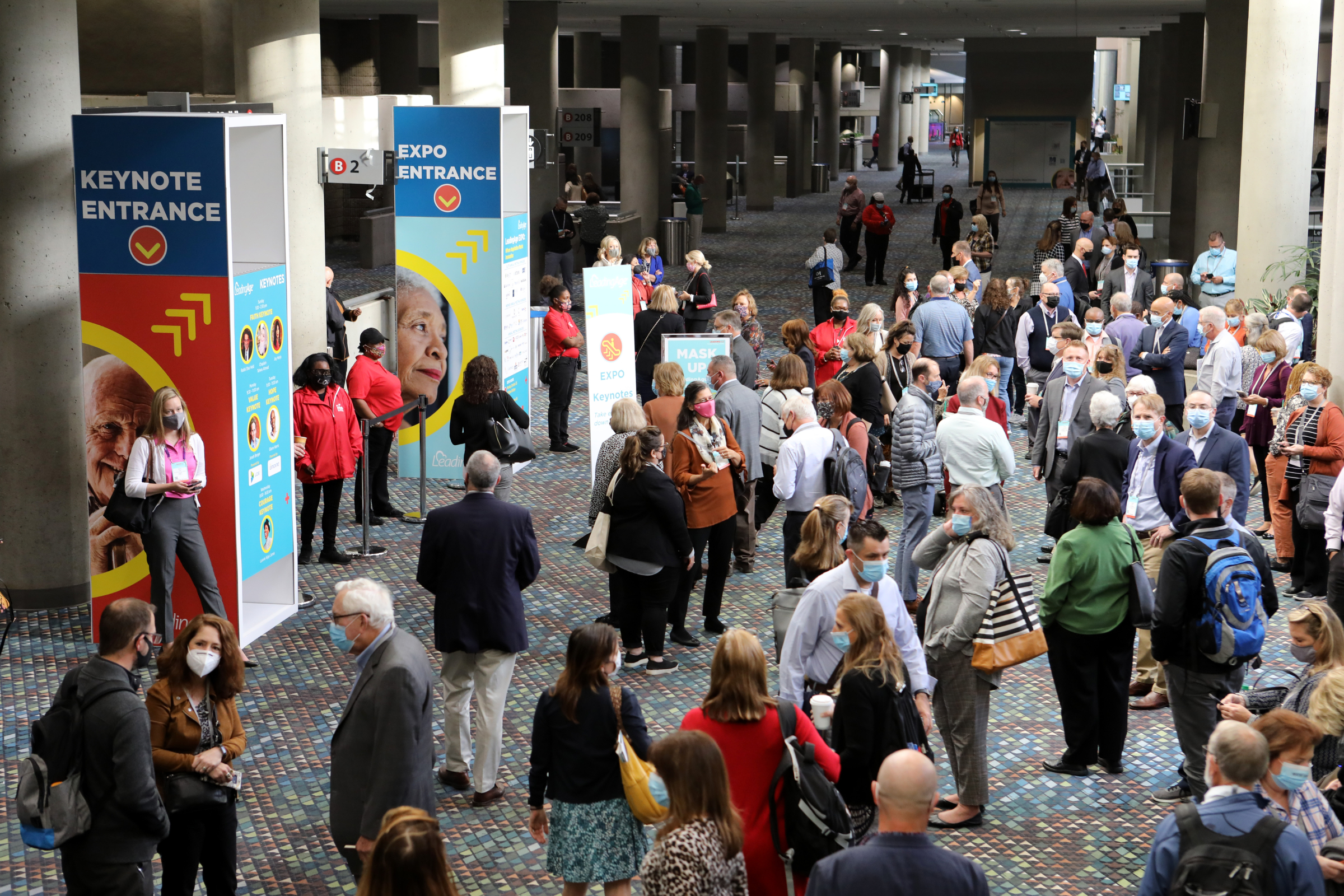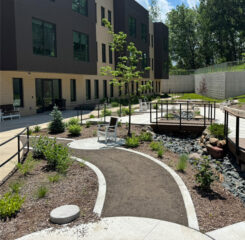Survey Shows Resident Social Isolation, Access to Services Top Concerns for Senior Housing Providers
On May 6, LeadingAge released the results of its third quarterly survey measuring the impacts of COVID-19 on affordable senior housing. The informal nationwide survey, held over two weeks in April 2021, captures pandemic impacts for housing providers serving more than 2.5 million older adults with low- or extremely-low incomes.
As the third in a series of similar questions, the quarterly results show trends in challenges facing senior housing providers and residents, including vaccination and testing efforts, financial strain at properties, and resident social isolation concerns. Most notably, the vast majority of affordable senior housing communities identified resident social isolation and access to services as their primary concern over the next three months.
With more than 99% of respondents reporting efforts to connect residents with vaccinations, the number of respondents aware of confirmed cases on-site flattened out since January, but remained above October levels. Cost burdens at communities, including severe cost burdens, also remain acute.
LeadingAge has continued to advocate with HUD and with lawmakers in Congress for healthier, more resilient communities where older adults with low incomes can age in community. LeadingAge priorities include expansion and preservation of affordable senior housing with services, increased Service Coordination in communities serving older adults, and internet connectivity throughout the senior housing portfolio.
Highlights of the survey results are below, and a full summary is available here.
COVID-19 CASES AT AFFORDABLE SENIOR HOUSING
The percentage of housing providers aware of COVID-19 at their communities is down since January, but still above October levels.
Because housing providers cannot require access to sensitive resident medical information, many do not know when there is a confirmed case of COVID-19 at their communities. However, some residents will voluntarily report illness to help others in the community stay safe.
In the LeadingAge surveys from October and January, the number of senior housing providers who reported being aware of COVID-19 cases at their housing communities went from moderate (59.92% in October) to severe (74.5%) in January. In the latest survey, the numbers have flattened to 66.4%.
Of the share of housing providers aware of COVID-19 at some or most of their properties, the number aware of COVID-19 cases in most properties remained steady since January at just over 34%.
FINANCIAL STRAIN AND COVID-19 PAYMENTS
Cost-burdens remain steady at over 60% of respondents feeling cost burdened or severely cost-burdened by COVID-19; the number of respondents with severe cost burdens increased slightly.
Many providers have incurred unexpected and unbudgeted expenses to keep communities as safe as possible during the pandemic, including hiring cleaning and security services and supplying PPE to residents and staff.
Despite two rounds of HUD supplemental payments to housing providers at the time the survey was conducted (HUD has since announced a third round), 61.98% of respondents report feeling at least cost-burdened, if not severely cost-burdened, by COVID-19. In fact, the percentage feeling severely cost-burdened deepened slightly since January.
Of the housing providers who received extra CARES Act payments from HUD to offset COVID-19 costs, most said they received COVID-19 Supplemental Payments in both the first and second round. However, only 6.19% of respondents report receiving extra grant-funded Service Coordinator payments, and more than half of survey respondents (55.75%) say they did not receive extra COVID-19 payments from HUD.
HUD has dispersed less than half of CARES Act funds approved by Congress in March 2020 for Multifamily Housing providers. In addition, more than one-third of respondents (40.19%) report delayed regular, non-CARES Act HUD payments, with the most common delays lasting between 1 and 5 months.
RESIDENT AND STAFF CONCERNS
More than three-quarters of survey respondents list resident social isolation and access to surveys as top community concern, followed by employee morale and resident health risks; challenges with low staff morale and staffing levels replace confirmed cases among employees as key staffing concern.
As the pandemic drags on beyond one year, concerns about social isolation and access to services have continued among housing providers serving older adults with low incomes. In fact, the survey showed that more than three-quarters of respondents (77.87%) report resident social isolation and access to services as their top community concerns for the next three months, similar to the survey results from January.
As confirmed cases drop off at communities, the survey showed that previous concerns about resident health risks plummeted; similarly, concern about COVID-19 cases among staff was replaced with employee morale as the key staffing concerns among respondents.
Lack of internet connectivity compounds social isolation: Many HUD-assisted residents lack access to the internet at the community or in-unit for social, informational, and telehealth purposes. Only 15.70% of housing provide report being able to pay for in-unit internet access for residents, and 41.31% of respondents report that most residents experience barriers to accessing internet in-unit.
VACCINATION AND TESTING ACCESS
Vast majority of respondents report assisting residents with vaccine access, mostly through CDC’s pharmacy partnership program; just under half of respondents estimate more than 80% of both residents and staff fully vaccinated.
Data shows that HUD-assisted residents are at higher risk for COVID-19 due to a number of factors, including race, age, and health, and many have mobility or transportation needs that create barriers to accessing COVID-19 resources. LeadingAge housing provider members have been instrumental in helping residents gain access to both testing and vaccination options during the pandemic.
An astounding 99.27% of housing providers report assisting residents with vaccine access through onsite or offsite clinics or appointments. Asked what percentage of residents are estimated to be fully vaccinated, nearly three-quarters (74.38%) estimated higher than 60% of residents, most of which estimated over 80%. Two-thirds (66.39%) of respondents estimated staff vaccinations rates at over 60%, again with most estimating over 80%.
Although many housing providers were able to host vaccine clinics on-site already, HUD and HHS recently announced a joint effort to connect HUD-assisted housing communities with community health centers that can engage any remaining residents who are undecided or face barriers in getting vaccinated.
PROPERTY OPERATIONAL CONCERNS
Vacancy issues, physical inspections, and financial challenges listed as top operational challenges; vacancy issues listed as number one operational concern for next three months, and insurance premium increases emerged as looming issue.
As properties continue to face challenges conducting pandemic-safe unit turn-over and waitlist applicants opt to defer move-in, vacancy issues were reported as the top operational concern during the next three months. In response to a question about COVID-19 impact on occupancy at properties, 45.08% said that vacancy rates are higher, 38.52% said that vacancy rates are unchanged, and only 16.39% said that vacancy rates are lower.
Physical inspections and financial issues followed vacancy issues as the top concerns for next quarter. With HUD’s recent announcement of significantly increased physical inspections, this is likely to become the priority concern during the next quarterly survey. Of the survey respondents with maintenance backlogs, most report 1-2 months needed to address backlogs.
Insurance premium increases have also emerged as a key concern among housing providers. Of survey respondents aware of an insurance rate increase, most reported increases between 15-35%; “market trends” was the most frequent reason given to properties, with not a single housing provider reporting historical claims as the reason given to the property for the increase.
The full results of the survey are available here; LeadingAge will repeat the survey quarterly to monitor trends in senior housing impacts during the COVID-19 crisis.

Most Recommended
July 03, 2025
 Budget Reconciliation 2025
Budget Reconciliation 2025
July 08, 2025
Pathways for Foreign-Born Workers
Recently Added
July 07, 2025



